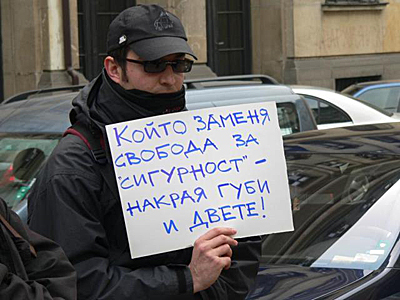On Jan. 30, the Bulgarian government promulgated Decree 40, which, among other things, allows the security services to gather from each internet user the data about who they have written to, who is on their contact lists, what instant communication agents they are equipped with, when they used them and the precise manner of using them. Institutions attributed the act to the requirements of Directive 2006/24/EC, but the majority of internet users in Bulgaria interpreted it as an encroachment on their civil liberties.
The civil initiative Electronic Frontier published on the internet a petition (BUL) against the decree, signed by over 1150 people already, and a number of Bulgarian bloggers put banners to support the campaign on their blogs.
On Feb. 7, Electronic Frontier organized a protest in front of the State Agency for Information Technologies and Communications (SAITC) in Sofia, the capital of Bulgaria.

“Those who trade freedom for security, lose both.”
Photo by www.nabludatel.info
According to blogger Bogomil Shopov, the protest's chief organizer, the event, even though not massive, sparked a lot of reactions from the press, TV and radio stations, and more than 4,000 websites.
On Feb. 23, a meeting of bloggers, online journalists, free-thinking people with an opinion of their own, and enthusiasts united by the idea of blogging, was held in Sofia. The discussions were focused on the Decree 40. Officials had been invited but none of them showed up. Many bloggers published reports from the event. Nelly Ognyanova, a renowned blogger and professor of media law wrote on her blog (BUL):
There will be no press release from BlogCamp, but the discussion on the Decree 40 of SAITC and the Ministry of the Interior was rather a discussion on the gradual loss of freedom. This issue is important and deserves to be delved in separately: the loss of freedom in small steps.
About this act in particular: there already exist sufficient means of surveillance and wiretapping, and the ministry of the interior already has the technical capabilities to trace messages. Decree 40 contains limitations to a constitutional right – and each and every time any limitations of the rights become an issue, the legislator has to make a judgment whether the balance between limitations and guarantees has been observed.
The constitution stipulates that such judgments are made in the parliament. In this case, the judgment has been made by the heads of two government institutions. This is a sufficient reason to challenge Decree 40. […]
On March 10, a group of bloggers, members of Electronic Frontier and Open Project Foundation, filed a complaint with the National Ombudsman, Mr. Guinyo Ganev – a complaint concerning their misgivings that the Decree runs counter to a number of civil rights enshrined in the Constitution and other principal acts, with an appeal for an examination. Nine days later, the ombudsman attended a discussion of the issue, which drew about 70 more people (plus the media).
Bogomil Shopov briefly reports (BUL) on the event in his blog:
Yesterday, there was a useful discussion on the encroachment on civil rights in Decree 40 and other regulations. The discussion was aimed not only at discussing the particular act of SAITC and the Ministry of Interior, but also at a debate on where the thin border between freedom and security passes.
Bogomil Shopov, a representative of Electronic Frontier, spoke about civil rights, the trust in the state and the institutions, the fears of the users and the widespread understanding that “in order to have freedom, indeed we have to have security, but this is neither the way, nor the principle” to achieve this. The official response wasn't too satisfactory:
An SAITC official offered an outline of the viewpoint of the Agency that has been the implementer but not the author of the decree. The familiar excuses followed – the obligations with the EU, the Directives…
Mr. Guenov, an advisor to interior minister Rumen Petkov, filled up his time with general talk. According to Shopov, he said that they (the interior ministry) “are still being instructed on these issues?!?”
On the positive side, Electronic Frontier has been offered to start working on a draft law regulating the issue, and the ombudsman is still at the outset of his examinations, writes Shopov.
He concludes:
For me, the task of raising awareness of the issue has already been solved. Now it’s the turn of other tasks.







9 comments
Thanks for this great story.
Another interesting story on Bulgarian bloggers: http://www.tol.cz/look/TOL/article.tpl?IdLanguage=1&IdPublication=4&NrIssue=262&NrSection=3&NrArticle=19477
Read more about bloggers…
Nice story. This shows people as well as goverment are concerned about internet “Bugging”.
Why Bulgarian government neglect the opinion of the nation about civil rights. I will search for political sanctuary and after that many facts will receive publicity!!!
The subject lose popularity BUT not importance. NEXT step after anonimus of the cell phones in Bulgaria will be BREAKING WITH Decree of Ministry of the Interior – THE BANK SECRET IN BULGARIA
Проблемът загуби популярностт си, но не и важността си! Събирана по този начин информация (кой с кого, и евентуално какво комуникира) води до възможност за политически рекет преди избори, изнасяне на иновативни интелектуални продукти (дисертации, дипломни работи, проекти, дизайни…) и продаване на икономически и бизнес данни! Когато към това се добави и задължаването със закон на банките да нарушават банковата тайна и премахването на анонимните телефони (Предплатените Прима пакети) картинката наистина става като взета от филма “Матрицата”